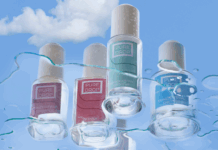A global collaboration of cosmetics and chemical industry experts will work with animal protection NGOs to accelerate the widespread use of non-animal science through research, education and regulatory engagement.
Today, more than 35 cosmetics manufacturers and suppliers, industry associations and animal welfare organizations announced the launch of the International Collaboration on Cosmetics Safety (ICCS) to ensure that animal-free methods are accepted and used by all those involved in cosmetics safety testing. ICCS will support innovation in animal-free cosmetic products and ingredients by funding the rigorous scientific evaluation of new animal-free safety assessment methods. It will share the results of these evaluation activities with cosmetic and chemical authorities and fund training and education activities to help build confidence in animal-free safety assessment methods.
" We have seen significant scientific advances in the development, evaluation, and use of animal-free methods to assess safety over the past few decades, said Erin Hill, President and CEO of CBCI. The ICCS brings together scientists from leading organizations around the world to build on this momentum and work toward our shared ambition of a future where no ingredients or products are tested on animals. The ICCS is a global collaboration focused on animal-free science for cosmetics and their ingredients, which currently face unique challenges and inconsistent global regulations. I am honored to lead the organization at such an important time. "
Hill joins CBCI from the Institute for In Vitro Sciences (IIVS), which she co-founded in 1997 and most recently served as president. IIVS is a non-profit research and testing laboratory dedicated to the use and acceptance of non-animal test methods worldwide. Ms. Hill brings extensive knowledge to the role of President and Executive Director of ICCS, having worked collaboratively with stakeholders to provide education and training in animal-free testing methods. Her position at ICCS will allow her to leverage the resources of IIVS and other members to create programs specifically designed to advance the acceptance of these new approaches for cosmetics and their ingredients.
ICCS will work with existing organizations to:
- Evaluate and further develop animal-free safety assessment methods and demonstrate their scientific validity for human health and environmental protection.
- Share the results of these evaluation activities with regulators to inform ongoing discussions on regulatory acceptance around the world.
- Provide education and training materials to accelerate widespread adoption the latest scientific findings in animal-free safety.
Through these efforts, ICCS strives to promote animal-free methods for cosmetic product and ingredient innovation worldwide.
" The safety of the cosmetic products that consumers use and trust every day is our top prioritysaid John Chave, interim chairman of the ICCS board of directors and managing director of Cosmetics Europe. Through the evolution of scientific methods, we can ensure that safety assessments of cosmetics and personal care products are conducted in a rigorous and ethical manner without animal testing. There is still much work to be done as science advances, and multiple research projects are already underway at CBCI to advance animal-free scientific methods. "
The cosmetics industry and animal welfare organizations have been at the forefront of the development, evaluation and use of animal-free safety assessment methods for nearly 40 years. In particular, they have contributed significantly to the replacement of regulatory animal testing to address skin irritation, genetic toxicology, eye irritation and skin sensitization through innovative in silico and in vitro methodologies.
Today, while animal-free research and scientific methods have advanced, many policies and regulations still require animal test data and have not yet incorporated the rapid advances in the application of innovative animal-free science to safety assessment. This leads to a need for animal data, even when viable alternatives exist. CBCI aims to bridge this gap by understanding the regulatory needs and providing sound scientific solutions based on innovative animal-free approaches.








